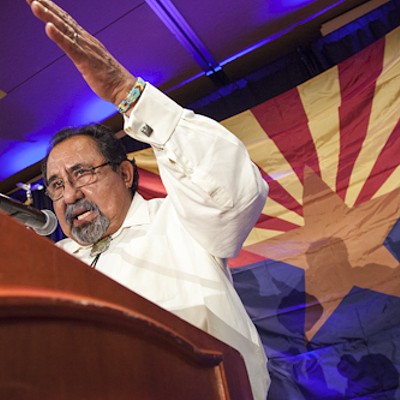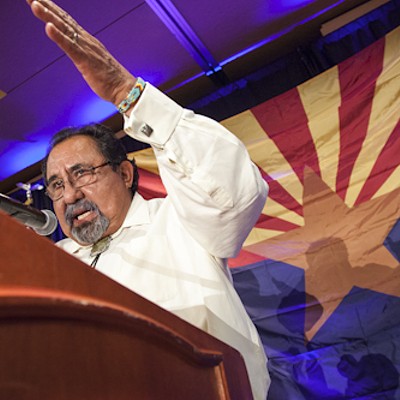Two weeks ago at its annual summer meeting, the Republican National Committee waded into the ongoing battle over immigration reform with a resolution that opposed any path to citizenship for undocumented people now in this country.
The resolution, authored by Arizona National Committeeman Bruce Ash and overwhelmingly approved by his fellow GOP leaders, calls instead for the undocumented to be granted legal status and a work permit that must be approved every two years. If someone with the new work permit were to be out of work for more than two months in any two-year period or were convicted of a crime, they would be subject to deportation.
The only exception would be the so-called DREAM Act kids, or minors brought to the United States by their parents. While they would also be ineligible for citizenship, they would be granted a special permit to remain in the country. The permit would be renewed every five years and, unless they were attending school or were employed, the DREAMers would also be subject to deportation.
The resolution stands in stark contrast to the immigration reform proposal passed by the Senate earlier this year, which proposes a 13-year path to citizenship for undocumented people now in the United States.
The Senate proposal, hammered out by the so-called Gang of Eight senators that included Arizona's John McCain and Jeff Flake, passed out of the upper chamber with 68 votes in late June after a last-minute amendment called for a "border surge" that included a doubling of the number of Border Patrol agents and more fencing along the southern border. But the legislation stalled in the House of Representatives, where House Speaker John Boehner said that rather than a comprehensive bill, his caucus would develop individual reform proposals.
Ash, who wrote in his resolution that "a majority of Americans support legal immigration and oppose any form of amnesty that would propose a pathway to citizenship for illegal aliens," told the Weekly that the RNC proposal could be a compromise that allows immigration reform to get support from Republicans who oppose a path to citizenship.
But without a path to citizenship, Democrats are not going to support comprehensive immigration reform. And without Democratic support in the Senate and the White House, there is no reform to be had.
Congressman Raul Grijalva says the absence of a path to citizenship is a deal-breaker for him.
"If that's out of the picture, then there is nothing to work out," says Grijalva, a seven-term Democrat who represents Southern Arizona's 3rd District.
From Grijalva's perspective, Democrats have already compromised. They have supported the security buildup in the Senate bill and other elements in exchange for a lengthy pathway to citizenship for those now in the country.
"There's considerable dissension in the pro-immigrant community among Democrats about how far we've gone already," Grijalva says. "To compound that by taking out the pathway effectively eliminates the ability of the deal to be able to push for it."
Grijalva says the pathway to citizenship is important to any deal because without it, "you will have a sub-class of permanent folks in this country with restrictions that no one else has, with fewer rights than everybody else has, and with no opportunity to make themselves full Americans. And that's not what America is about."
But Ash says immigration reform shouldn't depend on "creating future voters" for the Democratic Party.
Crashing the Senate's immigration-reform proposal would make many conservative Republicans happy, although other members of the GOP believe that passing some kind of reform proposal is crucial to the party's efforts to woo Latino voters.
McCain, who has spent time during the recess working the business community to support immigration reform, told the PBS News Hour last month that immigration reform doesn't automatically win the GOP "a single Hispanic voter, but what it does, it puts us on a playing field where we can compete for the Hispanic voter. If we don't do that ... I see further polarization of the Hispanic voter, and the demographics are clear that the Republican Party cannot win a national election. That's just a fact."
Neither McCain nor Flake appear willing to address the RNC resolution. Spokespersons for both senators did not return emails asking for comment on the proposal.
Grijalva believes Latino voters will hold Republicans responsible if immigration reform doesn't pass.
"The momentum is to get something done," Grijalva says. "If the House decides that they're going to be the ones who kill this, then it falls squarely on the shoulders of Republican leadership. Latino voters are not a monolith. Not everybody agrees on everything. But on this issue, there is agreement, and that will be the driving issue for a generation."
But Grijalva is becoming increasingly skeptical about the chances for immigration reform getting through the House of Representatives.
"My heart is optimistic," Grijalva says. "The realist in me has doubts."

















